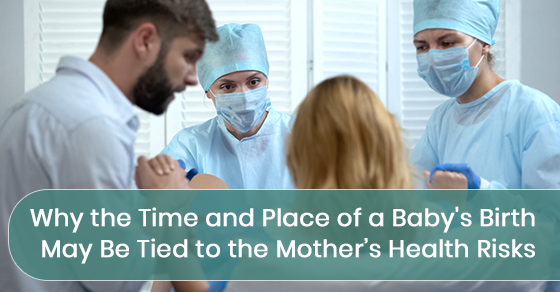When it comes to giving birth, a lot of attention is focused on the health of the newborn baby but research has shown that the mother’s health may be affected by the time and place the birth occurs.
There is always a risk of birth-related injury or complication during labour and delivery and if the physicians, nurses and medical professionals involved make mistakes, this can put the health of the mother and the child in danger. When this happens, it can start the beginnings of a medical malpractice claim.
A clinical study published in the international journal Risk Analysis analyzed over two million births in Texas ranging from 2005 to 2010 with a focus on maternal complications that hospital staff can reasonably control. These included:
- Severe perineal laceration
- Ruptured uterus
- Unplanned hysterectomy
- Admission to intensive care
- Unplanned operating procedures following delivery
The study had found that over 21,000 women suffered from one or more of these complications during birth. Not only that, but the study revealed some unexpected correlations. The risk for complications was noted to increase during night shifts, at 21% higher than daytime deliveries. In addition, weekend deliveries had a 9% higher chance of complications and on holidays, 29% higher. During these times, hospitals are usually understaffed or less experienced doctors are on duty.
The study also found that there was an increased risk of 28% of deliveries performed in teaching hospitals in July. This is a time when new residents are beginning their training.
The research goes to show that the experience of the physician and other medical staff is critical in the prevention of birth-related injuries or complications during labour and delivery. Having experienced doctors on duty when complications occur significantly reduces the risk of harm to the mother and vice versa, when there are fewer experienced doctors on duty this increases the risk of harm.
So the question is how can hospitals help to mitigate these risks? In many cases, scheduling was blamed for the increase in health risks. The solution then hinges upon whether hospitals are able to address and rearrange staff schedules to make sure that competent teams are on-site at all hours of the day.
For example, instead of scheduling two skilled physicians during the day and two unskilled physicians during the night shift, the hospital should substitute one skilled physician across all shifts. In this way, it can effectively negate the overall complication rate. If the hospital made efforts to have more competent teams it can produce more favourable delivery conditions for expecting mothers.
When can birth injury or complications lead to medical negligence litigation?
Not all labour and deliveries that involve the injuries mentioned above are grounds for medical negligence on the health professional or hospital. Knowing whether legal liability exists will mean you need to apply the medical malpractice laws to the facts of the case.
First, you will need to establish the reasonable medical standard of care for the situation where the mother or child was injured. For example, if the defendant was an obstetrician, the court will then compare the defendant’s actions with those of a similarly skilled and trained obstetrician in the same community or setting. In addition, the plaintiff’s lawyer will need to rely on a medical expert’s educated opinion to testify on the proper medical standard of care.
The medical information that was available to the defendant at the time of injury will also be taken into account. This is because the court recognizes that it would be unfair to use hindsight to hold a doctor legally liable for something they couldn’t have known during the time the injury took place.
Once the appropriate standard of care is settled, your healthcare provider’s actions will then be held against that standard. The medical expert on your case will take a detailed look at the actions of the defendant during the labour and delivery process, and state what would have been done by a similarly skilled care provider based on the facts and information available at the time.
The court will then determine whether the healthcare provider’s deviation from the standard of care was a legal cause of harm to the mother or the baby. And lastly, the court will identify and calculate the claimant’s injuries and other losses or damages resulting from the medical malpractice.
If it is found that the injury or complication would have occurred regardless of the doctor’s mistake, then there will be no legal grounds for medical negligence litigation.
Consult With Expert Birth Injury Lawyers
The quality of care a mother receives should not be affected by factors outside of the delivering mother’s control, such as the time and place where she gives birth. All healthcare providers have a responsibility to protect their patients and provide them with reasonable care in every circumstance. When hospitals incorrectly schedule their staff, overwork their staff or are understaffed, they are more likely to breach that level of duty and as a result, patients are exposed to a higher level of risk.
If you, your child, or a loved one has been injured because of a serious birth-related complication, you might be entitled to compensation. Medical malpractice litigations are one of the most complex claims and it is vital that you consult with experienced attorneys who are well-versed in medical issues. At Sommers Roth & Elmaleh, we have a proven track record of successful litigations for our clients.
To learn more about medical negligence litigation and obstetrics malpractice, call Sommers Roth & Elmaleh at 1-844-777-7372 or contact us here.

